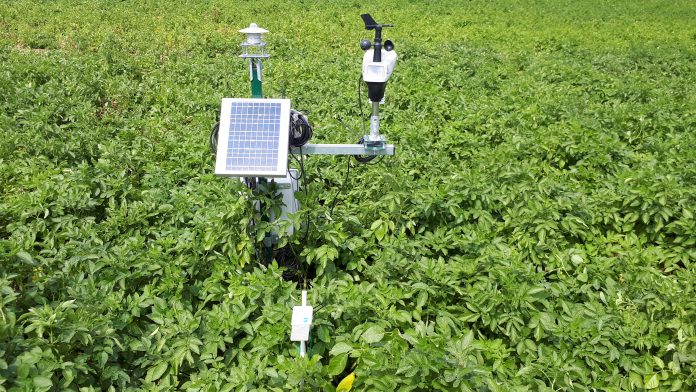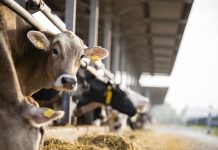Coordinators of IPMWORKS, Nicolas Munier-Jolain, and IPM Decisions, Neil Paveley, illustrate how integrated pest management acts as a pathway for European farmers to reduce pesticide inputs and improve production systems
The sustainable use of pesticides is required across Europe under the EU’s Sustainable Use Directive (SUD), which aims to reduce the exposure to and impact of pesticides on people and the environment. Integrated Pest Management (IPM) plays a key role in delivering the SUD, as part of a holistic approach to agro-ecosystem management. The European Commission has funded a series of work to develop and promote IPM resources, including IPM Decisions (H2020 project 817617) and IPMWORKS (H2020 101000339), running until 2024.
The Farm-to-Fork strategy, a major component of the European Green Deal, set the challenging goal of reducing the use and risk of chemical pesticides by 50% in 2030. To achieve this goal, significant changes are needed in current crop protection strategies used by farmers. The increasing number of farmers converting to organic agriculture will contribute to this task, however this alone is unlikely to achieve the goals.
Integrated Pest Management
IPM strategies are based on a holistic view of agro-eco systems, creating pest and disease resilient cropping systems that primarily use non-chemical pest management measures (e.g., diversified crop rotations, resistant cultivars, mechanical weeding). Pesticides are applied only when other measures fail to give sufficient control. In practice, many farmers limit the concept to “avoid unnecessary treatments”, without considering all components of IPM, with limited impact on pesticide use.
IPM Decisions and IPMWORKS help farmers and advisors to develop and apply holistic IPM strategies.
IPM Decisions
Decision Support Systems (DSS) are interactive systems (usually software based) that help farmers and advisors identify and solve problems and make decisions as part of their IPM strategy. IPM Decisions will increase their use and impact across Europe.
There is a diverse range of DSS available on the market, including many excellent examples of crop protection DSS that are well tested and implemented. A catalogue of 73 free-to-use or commercial pay-to-use DSSs has been collated so far, covering diseases (40), insects (26), weeds (6), slugs (2) and haulm killing (1). However, the proportion of farmers and advisors currently using DSS is relatively low. The IPM Decisions project will provide farmers and advisors easy access to IPM DSS through a pan-European online Platform and associated IPM Decisions Network.
Access to the Platform will be via a tailored ‘dashboard’, specific to the user’s requirements. As end users of DSS, farmers and advisors will benefit from a simple ‘click and go’ platform to find and run DSS that have been evaluated for their regional conditions, using freely available weather data integrated into the Platform. Alongside the Platform, IPM Decisions is working with stakeholders to better understand the socio-economic barriers and incentives to DSS uptake, and to identify opportunities to apply the lessons learnt to increasing DSS use throughout Europe.
IPMWORKS: Engaging DEMO farmers in pesticide reduction strategies
To achieve widespread reductions in pesticide use, European farmers first need to be convinced that it is possible to reduce the reliance on pesticides while maintaining, or even enhancing, farm productivity and profitability. A few pioneer farmers have achieved dramatic reductions in chemical inputs, thanks to a comprehensive holistic vision of IPM. They designed IPM-based strategies to reduce pest pressure using evidence based systemic
measures, rather than relying exclusively on pesticides for maintaining crop health.
IPMWORKS is an EU-wide network, coordinating groups of pioneer farmers. The network fosters knowledge exchange, facilitating further progression towards advanced IPM among the pioneer farmers, and organising demonstration events to support other farmers in adopting holistic IPM. The project demonstrates that “IPM works”, based on quantitative data collected in the demo farms. Advisors have a prominent role in the network, promoting a different way of farming for plant health, based on a strategic and systemic approach and peer-to-peer knowledge exchange.

Having demonstrated that IPM works, the second task is to ensure that farmers can easily access supporting resources in their transition towards advanced IPM. IPMWORKS will provide a multi-lingual online IPM Resource Toolbox, centralising IPM information and tools for farmers and advisors. This toolbox will help farmers build their own IPM-based strategies. The toolbox will be compatible with the IPM Decisions Platform, enabling greater impact across both projects.
Involve policy makers to sustain the European IPM community
IPM Decisions and IPMWORKS are both funded by the H2020 programme until 2024, but the coordinating teams are already thinking about the future sustainability of the networks and platforms set out during the projects. The IPM Decisions Platform, and the IPMWORKS Resource Toolbox and network of demo farmers, support the wide adoption of IPM. Lasting contributions to EU objectives, beyond each project’s completion, is limited only by the scale of engagement from stakeholders. The partners in both projects are therefore actively involved to make the tools and the network of pioneer farmers well known by policy makers, advisory services, and stakeholders of the agro-food market chains, at the regional, national and EU levels.
The next steps for IPMWORKS will be to increase the number of demo farms in the 16 countries where IPMWORKS is already working, to increase knowledge sharing in the farming community, and to extend the geographical area in the EU countries where the network is not installed yet. Training courses promoting the network methods and results are planned in those countries from 2022 to 2024, to pave the way for the launching of new groups of pioneer farmers, motivated to demonstrate that, in these regions also, “IPM works.”
In IPM Decisions, the Platform will be widely promoted in 2023, especially within the networks set up in IPMWORKS. As more DSS are integrated onto the Platform, the development of dashboards for farmers, advisors and researchers will ensure systems are available across Europe.
Together these two projects will ensure that farmers and advisors see the benefits of holistic IPM and have the tools and resources they need to implement it. Researchers will have a route to engagement with producers, ensuring effective innovations in IPM can rapidly be exposed to potential users. Finally, policy makers and other stakeholders will see the efforts being made towards the sustainable use of pesticides, and better understand how these can be supported through policy and supply chain management.
Please note: This is a commercial profile
© 2019. This work is licensed under CC-BY-NC-ND.











